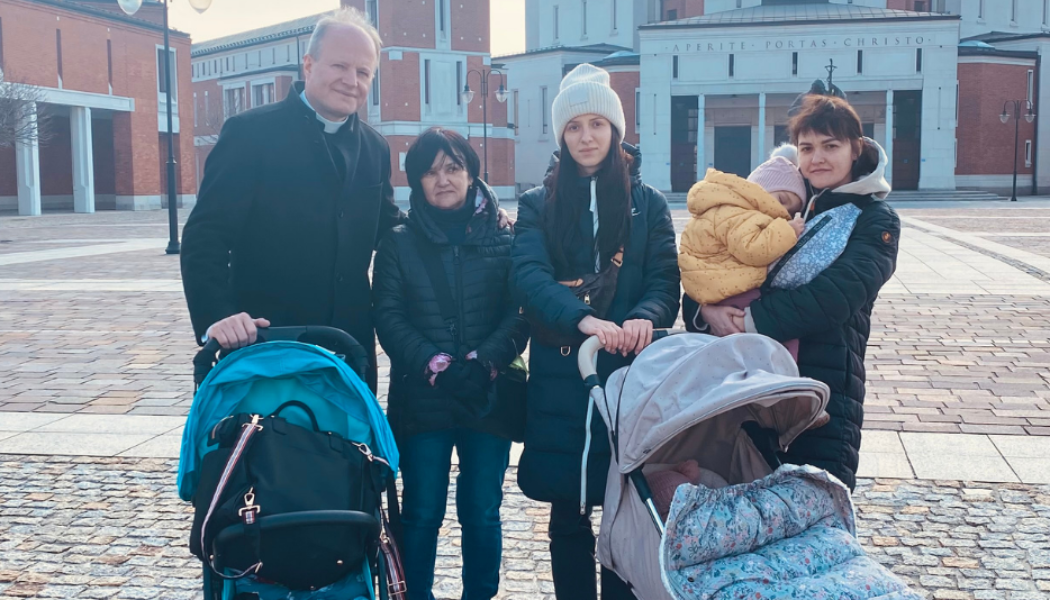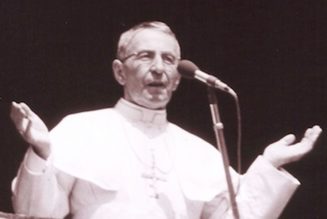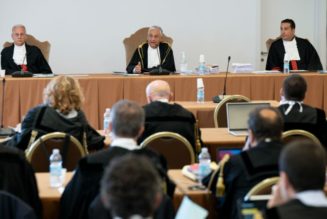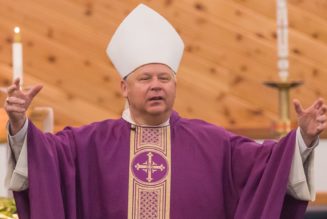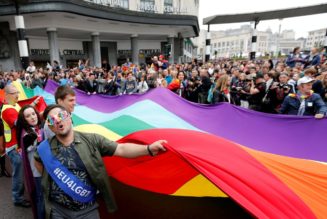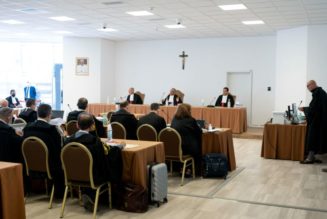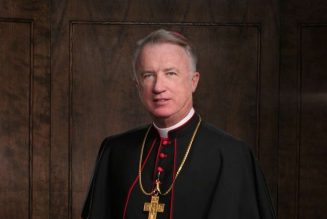KRAKOW, Poland — Women, mothers, with exhausted faces, lost and haggard gazes, veiled by anguish, holding their children with one arm, pulling their suitcases with the other.
These are the images that will remain indelibly in the memory of those present at the Krakow train station on the evening of Wednesday, March 2, when the Catholic faithful celebrated the beginning of Lent. At around 9pm that evening, a train from Ukraine with some 800 refugees on board entered the station, while the Archbishop of Krakow, Marek Jędraszewski, stood on the platform, accompanied by several priests and volunteers from the diocese, to welcome them.
The first distressing images were soon followed by touching scenes, wherein many refugees, comforted by the fatherly embrace of the archbishop, could finally let go of the emotions that had been gripping them for days. All of them were then given basic necessities before being taken to their respective places of welcome.
The hemorrhage of Ukrainian people fleeing towards Poland, which began eight years ago with the crisis in Crimea, has increased exponentially following the Feb. 24 Russian invasion of the entire country. Indeed, in just over a week, Poland has welcomed a wave of over 700,000 refugees on its soil.
“It’s not easy to talk about this,” Archbishop Jędraszewski told the Register after the encounter at the train station, with misty eyes. “Seeing all these children, these mothers, without their husbands forced to remain fighting in Ukraine, overwhelmed by distress and not knowing what to do; seeing so many of them cry deeply shook me. But we welcomed them with all the warmth and fraternity of which we were capable.”
Outpouring of Generosity
While the Polish state and municipalities have not skimped on the means invested to support these battered populations flocking to its soil, the Church remains in the front line to assist them on the ground, seeking to discern and respond to the many individual needs. In Krakow, like in all the main cities of the country, the local Caritas is offering a 24/7 assistance service to help in the distribution of refugees throughout the archdiocese, and beyond, as many of them only transit through Krakow before going to other large cities such as Warsaw or Wrocław, where Ukrainian communities are better established.
According to Agnieszka Homan, the spokeswoman for Caritas Krakow who discussed with the Register on March 5, the archdiocese has officially offered the refugees about 2,000 shelters, divided between cloisters, parish buildings, and the residences of parishioners, who are increasingly calling the Caritas switchboard to make rooms available in their own homes.
Homan explained that while the diocesan database mentions a permanent average of 500 refugees hosted in the diocese, this figure does not take into account the very many spontaneous hosting initiatives that are not coordinated through the diocese.
“We are entirely dedicated to assisting the Ukrainian population at this time, and have had to put aside many other activities to deal with this emergency,” Agnieszka Homan said. “The problem is fatigue … the coffee is no longer enough. And it’s only been a week! Alas, we know that this is only the beginning.”
Under the Banner of St. John Paul II
The rector of the Sanctuary of St. John Paul II in Krakow, Father Tomasz Szopa, no longer counts his hours of sleep either. Since the Polish government declared, shortly after the beginning of the Russian invasion, that the country would open its doors to Ukrainian refugees, the shrine’s pilgrim house has been welcoming an uninterrupted flow of families looking for a safe place to stay.
This is the case for Hanna Kondratyk, a Greek Catholic woman from Tarnopol who fled her country with her daughter and daughter-in-law, as well as their two 18-month-old babies. They reached the shrine on March 2, at the end of a long journey through Hungary, with the hope to be able to go back to their country, and to their husbands, as soon as things get better.

“I told my daughters about John Paul II who visited our country [in 2001] and I suggested that we seek refuge in his shrine,” Kondratyk told the Register, adding that they wanted to attend the Sunday Mass there, and to visit the shrine of Czestochowa. “We and Roman Catholics have one faith, only our rites are different.”
“Providing support to these families is such a special experience: the place of their ordeal is just a stone’s throw from us, and yet our situations are very different,” Father Szopa told the Register. “When they arrive, many people are still so anxious that they can’t sleep, but after a few days, the peace they find here helps them sleep again.”
He added: “I’m amazed how Polish people have reacted to this situation, they are really doing everything they can to help, we’ve received countless phone calls from faithful who ask how they can help, and they’ve sent so many goods and money … the response is great and it’s still growing.”
And the Poles on site are not alone in their daily efforts: they can count on the support of their American brothers from the John Paul II Project, a holistic formation initiative housed by the sanctuary for students from around the world, which focuses on St. John Paul II’s teachings. The project’s founders, Joseph and Corinne MacDonald, have made available two apartments usually reserved for students, and are currently hosting a dozen Ukrainians, who live alongside them.
“Before John Paul II died, he challenged the youth of the world to build the generation of love and truth,” Joseph MacDonald told the Register. “I’m telling the students that we see in America and in Europe, transgenderism, abortion … really bad things happen when you don’t have a civilization of love and truth. You also have war.”
Added McDonald, “The students come here, they see the Soviet Union that JPII helped destroy. It’s the same story that we’re going through now.”
Christian Unity
In a context of growing tensions with the European Union and after having been strongly criticized by many western politicians for its handling of the recent refugee crisis at the Belarusian border, Poland is now being held up as a model of solidarity by many international media in the Ukrainian crisis.
Beyond the common fear in the face of the Russian threat, this popular momentum from Poles towards their Ukrainian neighbor is, according to Archbishop Jędraszewski, part of a fraternal Christian approach that ignores “the complicated history” between the two countries. During World War II, the Ukrainian Insurgent Army was guilty of attempting an ethnic cleansing against Poles in the region of Volhynia.
“The Russian propagandists are actively trying to highlight that and revive these terrible memories to dissuade us from welcoming Ukrainian refugees, but it won’t work because Christianity, and therefore forgiveness, unites us,” the archbishop said.
To aid Caritas and the Archdiocese of Krakow in their work helping to settle Ukrainian refugees, please visit Caritas Krakow:
https://www.krakowcaritas.pl/aktualnosci.php/1530
https://www.facebook.com/caritas.krakow
Join Our Telegram Group : Salvation & Prosperity
